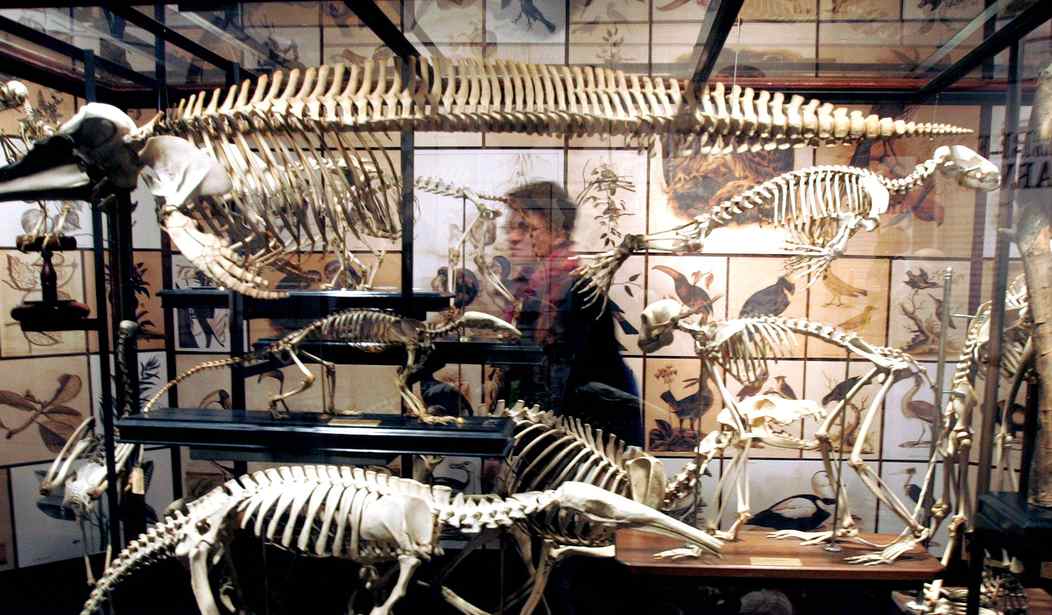Civilizations can collapse from information corruption, sometimes described as the loss of its “core values” or a decline in institutional competence. Just as a human being has mental health and a skillset a civilization may be thought of as possessing equivalent properties. If either “loses it” there may be dire consequences.
Have we lost it? A BBC article examines the chances our civilization is headed for collapse. One of the dangers it identifies comes from within culture itself. The “temporal exhaustion” of modern culture has material effects whose seriousness we now realize. The 21st century has taught all of us that software can control physical things. The naive Gramscian belief that one could gaslight an entire civilization yet somehow retain the power to switch off the effect at will was hatched in the innocent days before computer viruses. What if you can’t turn the virus off?
Recently Senator Diane Feinstein met a delegation of school children who took the standard rhetoric of climate change at its face value and hit her over the head with it. The senator was at pains to explain that ‘the really’ of official rhetoric wasn’t ‘really’ but she was hoist on her own party’s petard and may in the end be unable to escape its absolutist tenets.
The world may not reduce itself to a “lifeless husk” from CO2 but it may destroy itself through a collective loss of proportionality, by malware in the Kernel. The Democratic children are on the loose. If the 20th century can be described as the age of materialism and conflict, the 21st may be known as the age of information; the time we discovered angels and demons are real. Madness too can become incarnate and do stuff.
One of the vulnerabilities cited by the BBC study on civilizational collapse is today we are part of a “tightly coupled globalized system”. Unlike eras when mistakes and their consequences could be localized today a major error can affect everybody. The flip side of the claim that a Green New Deal can “save the world” is it can also destroy it.
It’s bad enough that random anomalies like the mutations that cause cancer are inevitably part of complexity; that events occur that we don’t anticipate often in the form of unintended technological disruption. Even systems composed of ‘simple’ actions which we would suppose to be ‘safe’ if expanded enough can take on a seeming life of their own. There isn’t even an easy measure of complexity that can be boiled down to a steam gauge indicator of this property. As Seth Lloyd put it:
An historical analog to the problem of measuring complexity is the problem of describing electromagnetism before Maxwell’s equations. In the case of electromagnetism, quantities such as electric and magnetic forces that arose in different experimental contexts were originally regarded as fundamentally different. Eventually it became clear that electricity and magnetism were in fact closely related aspects of the same fundamental quantity, the electromagnetic field. Similarly, contemporary researchers in architecture, biology, computer science, dynamical systems, engineering, finance, game theory, etc., have defined different measures of complexity for each field. Because these researchers were asking the same questions about the complexity of their different subjects of research, however, the answers that they came up with for how to measure complexity bear a considerable similarity to each other.
Kolmogorov tried to define complexity as the length of the shortest program that could describe a system. What he found was that in most cases you can’t even compute the lower bound of this metric. Complexity is an elusive quality. Despite this we play fast and loose with it.
One of the characteristics of comprehensive ideologies, as illustrated by the Green New Deal, is that because of their reductionist and global character they handle complexity with chunky policy interventions. This tends to increase the probability of “normal accidents” because the bureaucracy cannot manage the complex systems they feel compelled to control. Their solutions are nearly always “big”, global, radical and almost by definition compulsory. And the Green New Deal (GND) is “big. Really big.”
The resolution starts by enumerating the authors’ concerns about climate change: warning of the dire consequences if the earth continues to warm and the dangers of increased economic inequality. But it quickly takes a turn and, by the end, becomes an ambitious manifesto demanding—among many other things– a massive infrastructure initiative, a guaranteed job with a “family-sustaining wage,” and universal access to high-quality health care, affordable housing, economic security, high-quality education, and healthy food.
It also calls for increased government support for family farming, economic development in vulnerable communities, research and development, and environmental cleanup. And it would meet the goals of 100 percent renewable power production and no net increase in greenhouse gas emissions. All of this would occur through a 10-year “national mobilization.”
It will cost trillions. Explaining how such sums will be found opinion writers at the Huffington Post explain that cost is irrelevant because the government can just print any arbitrary amount of money required.
As a monopoly supplier of U.S. currency with full financial sovereignty, the federal government is not like a household or even a business. When Congress authorizes spending, it sets off a sequence of actions. Federal agencies, such as the Department of Defense or Department of Energy, enter into contracts and begin spending. As the checks go out, the government’s bank ― the Federal Reserve ― clears the payments by crediting the seller’s bank account with digital dollars. In other words, Congress can pass any budget it chooses, and our government already pays for everything by creating new money.
This is precisely how we paid for the first New Deal. The government didn’t go out and collect money ― by taxing and borrowing ― because the economy had collapsed and no one had any money (except the oligarchs). The government hired millions of people across various New Deal programs and paid them with a massive infusion of new spending that Congress authorized in the budget. FDR didn’t need to “find the money,” he needed to find the votes. We can do the same for a Green New Deal.
But even if money were no object the total commitment required by the Green New Deal incurs the opportunity cost of not pursuing an alternative strategy based on cheaper energy and climate adaptation — or even doing nothing. The Green New Deal for example rules out clean nuclear power. It can brook no rivals because solving Global Warming requires every resource we can muster. If we spend trillions on the GND we’ve no money left for anything else if it bombs.
Organisms in nature typically undertake multiple parallel strategems in order to survive. “The Red Queen hypothesis, also referred to as Red Queen’s, Red Queen’s race or the Red Queen effect, is an evolutionary hypothesis which proposes that organisms must constantly adapt, evolve, and proliferate not merely to gain reproductive advantage, but also simply to survive while pitted against ever-evolving opposing organisms in a constantly changing environment.”
Nature attacks and defends on many fronts. But a giant ideological bureaucracy can do what Darwin can’t: embark on a single strategy to the exclusion of all else. Nature hedges its bets but only socialism can bet the farm. They can do this because unlike Nature, which doesn’t know what’s going to happen, central planners are frequently sure their policy fixes will work.
Representative Alexandria Ocasio-Cortez (D., N.Y.) questioned the morality of bringing children into a world that is struggling to address man-made climate change in a video posted to social media over the weekend.
“There’s scientific consensus that the lives of children are going to be very difficult. And it does lead young people to have a legitimate question: is it okay to still have children?” Ocasio-Cortez told her 2.5 million Instagram followers.
Consensus becomes equal to certainty and in the context of our “tightly coupled globalized system” you have to go along since it’s always an all or nothing deal. In reality the chances of AOC and Bernie Sanders being able to manage a system as complex as the Earth’s climate may not be as good as they think but odds are they’ll try to do it anyway.
Follow Wretchard on Twitter
For a list of books most frequently purchased by readers, visit my homepage.
Support the Belmont Club by purchasing from Amazon through the links below.
Books:
Walking with Destiny, by Andrew Roberts. There have been over a thousand previous biographies of Churchill but in this new book, one of Britain’s most acclaimed historians, Andrew Roberts, draws on over 40 new sources, including the private diaries of King George VI, to depict him more intimately and persuasively than any of its predecessors.
Dead Mountain: The Untold True Story of the Dyatlov Pass Incident, by Donnie Eichar. In February 1959, a group of nine experienced hikers in the Russian Ural Mountains died mysteriously on an elevation known as Dead Mountain. Eerie aspects of the incident — unexplained violent injuries, signs that they cut open and fled the tent without proper clothing or shoes, a strange final photograph taken by one of the hikers, and elevated levels of radiation found on some of their clothes — have led to decades of speculation over what really happened. This gripping book tries to solve the mystery, using the hikers’ own journals and photographs, rarely seen government records, dozens of interviews, and the author’s retracing of the hikers’ fateful journey in the Russian winter.
Shades of Magic Boxed Set: A Darker Shade of Magic, A Gathering of Shadows, A Conjuring of Light, by V.E. Schwab. This trilogy set is a must-have for collectors and readers of Schwab’s fantasy books. The Near Witch To be released in March 2019, this is a new edition of Schwab’s long out-of-print debut novel.
For a list of books most frequently purchased by readers, visit my homepage.
Did you know that you can purchase some of these books and pamphlets by Richard Fernandez and share them with your friends? They will receive a link in their email and it will automatically give them access to a Kindle reader on their smartphone, computer or even as a web-readable document.
The War of the Words, Understanding the crisis of the early 21st century in terms of information corruption in the financial, security and political spheres
Rebranding Christianity, or why the truth shall make you free
The Three Conjectures, reflections on terrorism and the nuclear age
Storming the Castle, why government should get small
No Way In at Amazon Kindle. Fiction. A flight into peril, flashbacks to underground action.
Storm Over the South China Sea, how China is restarting history in the Pacific
Tip Jar or Subscribe or Unsubscribe to the Belmont Club;










Join the conversation as a VIP Member